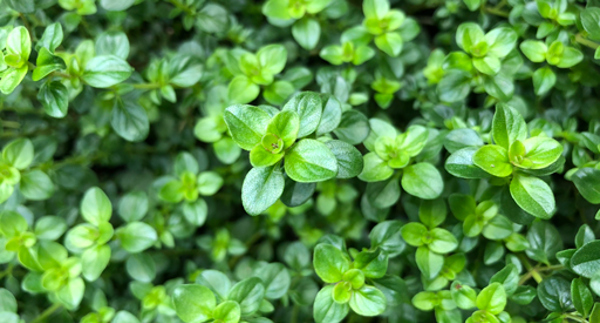
5 Steps to Thyme Planting Success
- Choose a warm sunny spot in the garden or for your pots and containers.
- Prepare your soil with organic matter like compost and sheep pellets.
- Add a layer of herb mix to plant into. Thyme can be planted year-round in New Zealand.
- Feed thyme in spring to promote green leafy growth.
- Prune back in late winter/early spring to stimulate new leaves.
Follow our full guide below to a bumper crop of homegrown thyme.
Packed full of flavour and aroma, thyme is a handy herb in the kitchen and a fragrant, ornamental addition to gardens, including cottage gardens. Commonly used as a garnish and to flavour a wide variety of meals, it pairs perfectly with tomatoes for pasta and pizza sauces.
Prepare
Every gardener can make room for thyme. Happy in pots, containers, in the garden or used a ground cover, thyme will cope with dry periods and can be grown and used year-round.
Popular types of thyme include:
- Common: a hardy, low-growing plant with pointy, dark green leaves that are packed with flavour.
- Creeping: can be used as an attractive groundcover which produces white flowers in summer.
- Golden: adds a pop of colour and flavour with small, aromatic yellow and gold leaves.
- Lemon: brings a fresh lemony flavour with its bright, rounded green leaves. Perfect for use with fish and poultry as well as in fruit salads.
- Pizza: an evergreen herb with large, glossy leaves and hints of oregano flavour.
Like building a house a good foundation is the key to success in your garden. The better the soil, the better your plants will grow. Thyme enjoys a warm, sunny spot in fertile, well-drained soil.
If you are starting with an existing garden bed dig in organic matter like Tui Organic Sheep Pellets and compost to your soil. Then you can add a layer of Tui Herb Mix, a free draining planting mix, rich in nitrogen to promote green, leafy growth and continuous harvesting.
If planting in pots and containers, fill these with Tui Herb Mix.
Plant
Thyme will grow quickly and easily from seedlings or cuttings (take 5-8cm stem cuttings anytime but winter), rather than seeds.
The best times to plant are early in the morning or late in the day, so the plants aren’t exposed to the hot sun straight away.
Planting in garden beds
- Soak seedlings in a bucket of Tui Organic Seaweed Plant Tonic and allow to drain. This will help prevent transplant shock and give your plant a healthy boost.
- Add a layer of Tui Herb Mix to the planting area.
- Dig a hole, approximately twice the size of the root ball of your plant.
- Gently loosen the root ball of your plant and position the plant in the centre of the hole.
- Fill in with Tui Herb Mix.
- Press soil gently around the base of the plant.
- Water your plant well and continue to water regularly.
Planting in pots and containers
- If your container has no drainage holes, add stones to the bottom of the container to act as drainage.
- Soak your seedlings in a bucket of Tui Organic Seaweed Plant Tonic before planting and allow to drain. This will help prevent transplant shock and give your herbs a healthy start.
- Half fill your container with Tui Herb Mix.
- Gently take the plant from the current container, loosen the root ball and remove any loose or dead plant material and roots.
- Position the plant in the centre of the new container and fill with Tui Herb Mix up to 3cm from the top.
- Gently firm mix around the base of the plant. The mix should be at the same level on the plant as it was in the previous container.
- Water your plant well and continue to water regularly.
Nourish
Feed your herb and they will feed you. Plants use nutrients from the soil as they grow, so replenishing the nutrients ensures your they grow to their full potential.
Feed your thyme with Tui NovaTec Premium fertiliser in spring. Well watered, well nourished herbs will have a better chance of keeping insect pests and diseases at bay.
For supercharged feeding with quick visible results try Tui Vege & Herb Liquid Superfood.
Regular feeding and applications of Tui Organic Seaweed Plant Tonic will help keep your thyme healthy as it grows.
Tui Tips:
- Pick fresh leaves and stems as required.
- If rust is an issue on leaves, remove the infected leaves.
- Prune thyme back in late winter/early spring to encourage fresh new growth.
- Leaves can be dried to make thyme vinegar and oil.